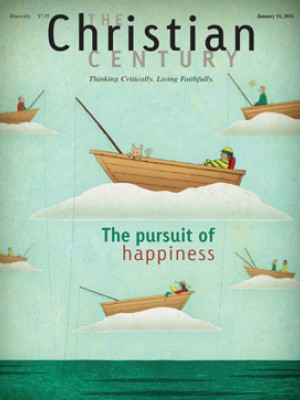Sunday, January 23, 2011: Matthew 4:12-23, Isaiah 1:9-4
There are places where Epiphany light shines through people who do the best of things in the worst of times.
The Matthew 4 and Isaiah 9 readings assigned for this third Sunday of Epiphany each begin with geographic references that are easily overlooked. Zebulun and Naphtali are more than Galilean locations. Both words signaled to eighth-century BCE hearers what Vietnam, Abu Ghraib and Guantánamo Bay signal to our ears—the hellishness of war and the darkness engulfing those who live in its aftermath. But Zebulun and Naphtali are also cited as "crossroads of the nations, where people sitting out their lives in the dark saw a huge light" (The Message). Jesus chooses this background, one weighted with historical meaning, as the setting from which to carry out his Galilean ministry. With astonishing boldness he announces that he is the One in whom Isaiah's prophecy is at last fulfilled, and who calls all to repent and receive the kingdom of heaven now at hand.
These texts are loaded with Epiphany promise—what lay hidden in the mystery of God's sovereign reign is now out in the open, offering the light of Christ's grace to all in every place and circumstance. We who are numbed by daily media reports on the plight of people still walking in the thick darkness of hunger, injustice, crime, disease and futile wars need ears open to other news. There are places where Epiphany light shines through people who do the best of things in the worst of times. For example, in Bethlehem where our Lord was born, 70,000 Palestinians are walled in by Israeli military occupation and surrounded by illegal settlements on confiscated Palestinian land. Here Palestinian Lutherans have defied all odds by building a wellness center, a medical clinic, a first-rate cultural center hosting local and international events and a K-12 school for Muslim and Christian students. Two months ago, the first fine arts college in the Arab world was opened under their sponsorship. Dar Al Kalima ("house of the Word") has 200 full-time students and a thousand more in part-time studies. Despite a dwindling number of Arab Christians, the inclusive organization called Diyar ("home") serves women, children, youth and the elderly; it is the third largest employer in Bethlehem. I asked Mitri Raheb, the pastor of Christmas Lutheran Church and founding director of Diyar, what keeps him from going crazy under relentless pressures.
Read our latest issue or browse back issues.
"I start a new project," he said—his way of witnessing to the power of Epiphany light that breaks through the thick darkness of the seemingly impenetrable Arab/Israeli conflict.
The Epiphany texts point to God's saving reign, which is continually on the move to the ends of the earth as well as to the innermost reaches of the human heart. The texts invite not lament over how gloomy things are but lively, imaginative following of the light of Christ through whatever darkness defies it. We become partners in faith with those throughout the world whose mission is—with an Epiphany twist on the pun—to make light of the darkness.
The great new fact of our time is that the center of gravity in the Christian world has shifted from Europe and North America to Africa, Asia and Latin America. Think of this: in the past hour Christian numbers in the Global South have increased by 18,000, while in the Global North Christian numbers have decreased by 3,000. Do people know that? Can Epiphany faith, thought and action in congregations here go beyond impersonal statistics which can discourage or tempt toward superficial mimicry if left without interpretive discernment?
Philip Jenkins's Century columns on the global church can help us all get on with thinking globally and acting locally. More to the point, Epiphany awareness grows when parishioners return with stories of mission travel and service projects abroad, when congregations host guests from overseas, or when people in local congregations find ways to reach out in welcome to neighbors who have moved in from distant lands. Then hospitality becomes a two-way street. Gifts of mind and spirit brought by those who are outwardly different are fresh treasures of more lasting value than gold, frankincense and myrrh.
Matthew 4:18–23 offers more glimmers of Epiphany light as Jesus calls Simon, Andrew, James and John to discipleship. Here the textual application illumines the congregation as prime territory for the Lord's call to reach those gifted for pastoral teaching or diaconal ministries in the church. Jesus invited four fishermen to discipleship as he found them at their nets; that history of calling, inviting and recruiting disciples reaches down to our day. Among us in our congregations are people, many of them in their teens, who need someone to hint at something they may not yet have sensed—their potential for a vocation of equipping God's people for daily ministry in the world. A timely comment, offhand though it may be, can have consequences. According to today's gospel, it can become soil for such seeding.





